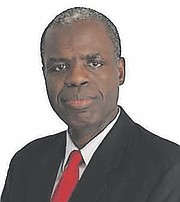By YOURI KEMP
Tribune Business Reporter
ykemp@tribunemedia.net
The Central Bank’s governor yesterday warned that the government must reimpose fiscal discipline once the COVID-19 crisis has passed so it can continue to access the debt markets.
John Rolle, during a webinar hosted by the Ministry of Finance, said the government’s ability to borrow during the pandemic was critical to shielding the Bahamian economy and society from the worst effects of the pandemic’s economic fall-out. However, he warned that such fiscal headroom needed to rapidly be rebuilt once the COVID-19 situation has eased.
“We must have discipline in ordinary times so that people would feel comfortable with extending the country credit,” Mr Rolle said, adding that the government’s ability to raise financing is based on “a belief that this country can repay this debt”.
K Peter Turnquest, deputy prime minister, said spending discipline was vital despite the $1.3bn fiscal deficit that the government plans to run during the 2020-2021 budget year. “We have to make sure that we maintain our expenditure profile so that when we do invest on the capital side we’re investing in projects that are going to bring some economic stimulus to the overall position, drive up our tax revenue, support our tax base as well as provide opportunities for individuals for them to be able to meet their needs,” he added.
“In addition to that, a key component is that we have to grow this economy and, even in this weakened position, we have to find ways to provide stimulus for growth.” Mr Turnquest said that part of the government’s stimulus effort is its investment in the Small Business Development Centre (SBDC) and “entrepreneurial spirit” of Bahamians.
Mr Rolle also differentiated between the national debt and the central government’s liabilities, saying: “There is this third measure of debt that we also look at, which is the total debt that is owed by the government - whether it is guaranteed by the government, or it is borrowed outright by the corporations.
“The difference between the national debt and the direct charge, or the central government debt, is that in ordinary times the direct charge is borrowing that is taken on directly by the Consolidated Fund, and therefore every year in the budget the government would provision to pay the interest and the principal for debt servicing.”
The Central Bank governor added: “The contingent liabilities are usually when the government steps in and guarantees the borrowing of the public enterprises, or any entity the government chooses to guarantee. In ordinary times those entities would continue to service their own principal and interest payments, but if they run into difficulties the government steps in and helps with the payment.
“The reason why, in countries like ours, total public debt matters as well, is because if we have a very credible government then there is also the assumption that the government will stand by any of its entities and undertake borrowing and, if they run into difficulties, the government will do what is needed to make certain that those entities will honour their obligations.
“From that point of view the public debt becomes important for the country, but also a government having credibility can allow its public enterprises to borrow without necessarily the explicit guarantee that it would repay. That doesn’t mean that the government would not repay, but just that explicitly it doesn’t have to provide the guarantee.”





Comments
tribanon 5 years, 8 months ago
John Rolle and Brensil Rolle had better start explaining why the national insurance board seems to have stop paying pension and other benefits to Bahamian retirees living abroad. Have the local commercial banks been told to stop converting Bahamian dollars to the hard currencies necessary to effect these payments? Are these Bahamians now being robbed of their entitlement to national insurance pension and other benefits simply because they live abroad and the government is now desperate to avoid the depletion of our country's rapidly dwindling foreign currency reserves? What's going on here?
Porcupine 5 years, 8 months ago
Mr. Rolle is not being honest, and he knows it. When he says, "We must have discipline in ordinary times so that people would feel comfortable with extending the country credit,” Mr Rolle said, adding that the government’s ability to raise financing is based on “a belief that this country can repay this debt”. Those who are presently lending to failed states, such as ours, know they will never be paid back. They know it. They also know that the collateral and pledges made by distressed country's politicians, far exceeds the cash they have created out of thin air to hand to these politicians. Look closely at who "owns" this debt. They will soon be in control of every small country on this planet. You think Minnis and Turnquest care if, or how, these loans, always more loans, will be repaid? Get real. These guys are knowingly selling this country out from under Bahamian's feet. Why doesn't Mr. Rolle speak clearly about this fiscal responsibility he claims is needed? Why can't he be specific, and speak directly about "what" needs to be done? Hasn't he thought this through? So, why the silence? Isn't this clear? He is a functionary in the playbook. Not because it is an insidious game they are playing, but because they can't even imagine another way. There is no way of knowing, due to the lack of transparency, lack of honesty and lack of freedom of information laws, just what parts of this country, which of our natural resources, which parks and historical sites are due to be taken over when we fail to pay up on these loans. Does anyone else find this sad and irresponsible to do to our children?
Sign in to comment
OpenID